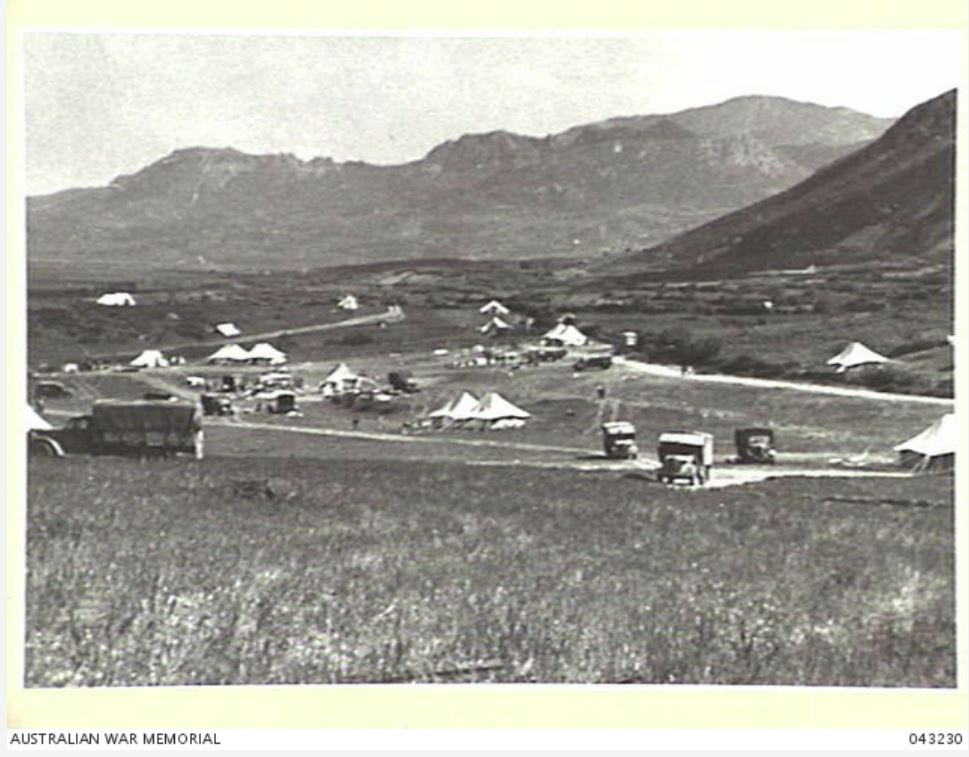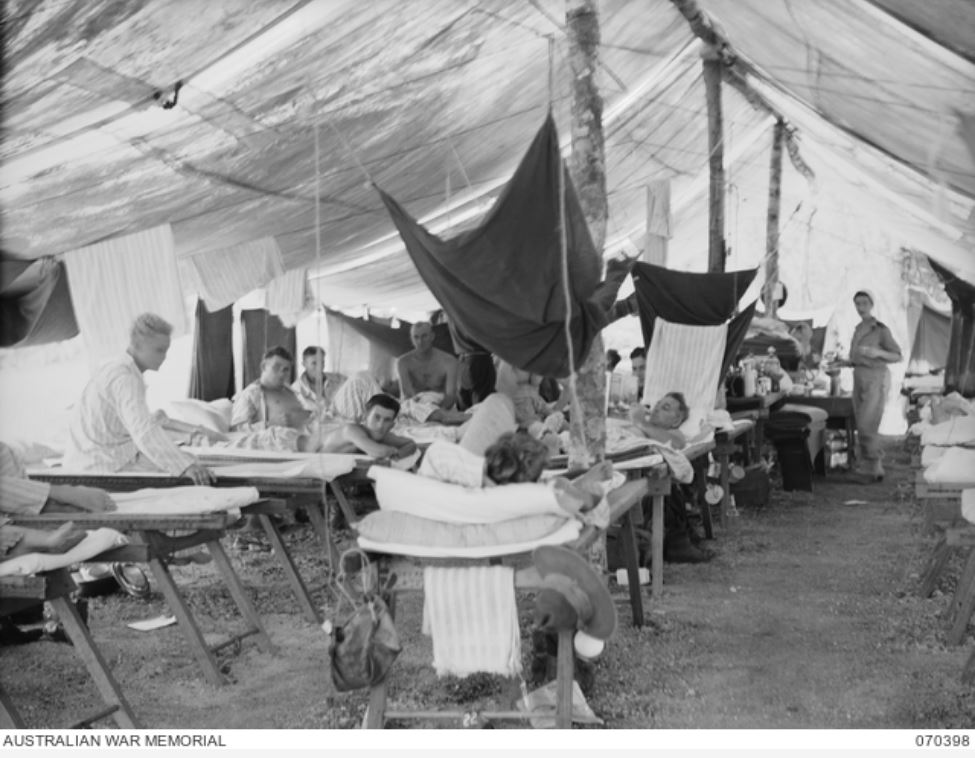Difference between revisions of "2/3rd Australian Casualty Clearing Station"
From Our Contribution
(→Patients) |
(→Patients) |
||
| (21 intermediate revisions by the same user not shown) | |||
| Line 14: | Line 14: | ||
==Brief History== | ==Brief History== | ||
| − | Formed at Wallgrove, NSW it was initially intended to support the 8th Division and moved to Cowra in September 1940 to prepare. However, in December it was reallocated | + | Formed at Wallgrove, NSW it was initially intended to support the 8th Division and moved to Cowra in September 1940 to prepare. However, in December it was reallocated to the 9th Division, ad left for the Middle East in December where they established themselves at Hill 60 in Palestine. In March 1941 they were again reallocated, this time to the 6th Infantry Division and went with them to Greece where they operated at Larissa and then at Ellasson before being forced back in late April to the beaches at Navplion from where they were evacuated. As with many other units they were forced to leaved most of their equipment behind. Following a short stay on Crete they moved back to Kilo 89 in Palestine. |
| − | Following the Armistice in Syria, they moved to Beirut where they acted as a hospital. With Japan's entry into the war, most Australian troops returned to Australia with the exception of the 9th Division to which they were attached. In June they relocated to Tripoli from Beirut, but soon after were rushed to the western desert to support units seeking to halt the rapid German advance on Egypt. The 2/3 Australian casualty Clearing Station was to establish itself at Sidi Bishr, where they supported troops defending the line around El Alamein. When the British forces broke out, the Heavy Section operated at Burg el Arab and the Light Section further forward at Hamman. Before they were recalled in December, the Light Section had reached Mersa Matruh and the Heavy Section Garawla. They left the Middle East for Australia in January 1943. | + | Following the Armistice in Syria, they moved to Beirut where they acted as a hospital. With Japan's entry into the war, most Australian troops returned to Australia with the exception of the 9th Division to which they were attached. In June 1942 they relocated to Tripoli from Beirut, but soon after were rushed to the western desert to support units seeking to halt the rapid German advance on Egypt. The 2/3 Australian casualty Clearing Station was to establish itself at Sidi Bishr, where they supported troops defending the line around El Alamein. When the British forces broke out, the Heavy Section operated at Burg el Arab and the Light Section further forward at Hamman. Before they were recalled in December, the Light Section had reached Mersa Matruh and the Heavy Section Garawla. They left the Middle East for Australia in January 1943. |
| Line 25: | Line 25: | ||
===Patients=== | ===Patients=== | ||
| + | '''Tripoli, Lebanon''' | ||
| + | * [[Edwin Reed Marshall]] 24 - 27 Sep 1941 | ||
| + | * † [[John Hector Russell MacDonald]] 14 - 15 Apr 1942 | ||
| + | * [[Edgar Paul Siebner]] 14 - 20 Apr 1942 & 27 Apr - 8 May 1942 | ||
| + | * [[Thomas Stanley O'Meagher]] 16 - 18 Jun 1942 | ||
| + | * [[Victor Henry Mead]] 28 Jun 1942 | ||
| + | |||
| + | '''Greta''' | ||
| + | * [[Hubert James (Jim) Gale]] 11 Jul 1942 | ||
| + | |||
| + | '''Wondecla, Queensland''' | ||
| + | * [[Edward Arthur Sewell]] 2 - 10 Jun 1943 | ||
| + | * [[Edmond Hepple Brown MID]] 6 - 19 Jul 1943 | ||
| + | |||
'''Lae, New Guinea''' | '''Lae, New Guinea''' | ||
| + | * [[Walter Vivian Ernest Peters]] 14 - 26 Sep 1943 | ||
| + | * [[Lawrence Gerald McDonough]] 12 - 16 Nov 1943 | ||
| + | * [[Edward Arthur Sewell]] 20 - 25 Oct 1943 | ||
| + | * [[Harry Alfred Curtis]] 23 - 26 Oct 1943 | ||
| + | * [[Frederick Joseph Powell]] 25- 28 Oct 1943 | ||
* [[Lawrence Gerald McDonough]] 12 - 16 Nov 1943 | * [[Lawrence Gerald McDonough]] 12 - 16 Nov 1943 | ||
* [[Stanley Upton Hammond]] 13 - 16 Nov 1943 | * [[Stanley Upton Hammond]] 13 - 16 Nov 1943 | ||
| + | * [[Mervyn Roy Drummond]] 23 - 28 Nov 1943 | ||
| + | * [[Edward Arthur Sewell]] 27 - 30 Nov 1943 | ||
| + | * [[Thomas Stanley O'Meagher]] 29 Nov 1943 | ||
===Individual Honours=== | ===Individual Honours=== | ||
Latest revision as of 20:52, 7 April 2023
 2-3rd CCS at Lavadia, Greece April 1941 AWM photo 043230 | |
 31 Jan 1944 2/3rd CCS's Ward 6 at Finschhafen AWM photo 070398 | |
Brief History
Formed at Wallgrove, NSW it was initially intended to support the 8th Division and moved to Cowra in September 1940 to prepare. However, in December it was reallocated to the 9th Division, ad left for the Middle East in December where they established themselves at Hill 60 in Palestine. In March 1941 they were again reallocated, this time to the 6th Infantry Division and went with them to Greece where they operated at Larissa and then at Ellasson before being forced back in late April to the beaches at Navplion from where they were evacuated. As with many other units they were forced to leaved most of their equipment behind. Following a short stay on Crete they moved back to Kilo 89 in Palestine.
Following the Armistice in Syria, they moved to Beirut where they acted as a hospital. With Japan's entry into the war, most Australian troops returned to Australia with the exception of the 9th Division to which they were attached. In June 1942 they relocated to Tripoli from Beirut, but soon after were rushed to the western desert to support units seeking to halt the rapid German advance on Egypt. The 2/3 Australian casualty Clearing Station was to establish itself at Sidi Bishr, where they supported troops defending the line around El Alamein. When the British forces broke out, the Heavy Section operated at Burg el Arab and the Light Section further forward at Hamman. Before they were recalled in December, the Light Section had reached Mersa Matruh and the Heavy Section Garawla. They left the Middle East for Australia in January 1943.
In April 1943 the unit reassembled after leave at Kairi in Queensland, before moving to Wondecla in June. In August they moved to Milne Bay in Papua, and the following month they landed on Red Beach near Lae to handle casualties from the advance on Lae. Soon after the Light Section accompanied the 20th Australian Infantry Brigade when it landed on Scarlet beach at Finschhafen. In October the rest of the unit moved to Simbang to handle casualties from the Finschhafen fighting before moving to Heldsbach Plantation in January 1944. IN May they were withdrawn t Australia for leave and a rest, reforming at Mapee in Queensland to await a role in the landings north of New Guinea. In early 1945 it became clear that this would be a landing at Balikpapan where there were important oilfields. In May they absorbed the 21st Hospital laundry Unit and moved to Morotai prior to their movement to Balikpapan in July where they remained for the rest of the war.
Four members lost their lives while members of this unit: two killed in action in Egypt on 2 Dec 1942, one died of illness in Syria; and one died in Australia (No cause of death given).
Patients
Tripoli, Lebanon
- Edwin Reed Marshall 24 - 27 Sep 1941
- † John Hector Russell MacDonald 14 - 15 Apr 1942
- Edgar Paul Siebner 14 - 20 Apr 1942 & 27 Apr - 8 May 1942
- Thomas Stanley O'Meagher 16 - 18 Jun 1942
- Victor Henry Mead 28 Jun 1942
Greta
- Hubert James (Jim) Gale 11 Jul 1942
Wondecla, Queensland
- Edward Arthur Sewell 2 - 10 Jun 1943
- Edmond Hepple Brown MID 6 - 19 Jul 1943
Lae, New Guinea
- Walter Vivian Ernest Peters 14 - 26 Sep 1943
- Lawrence Gerald McDonough 12 - 16 Nov 1943
- Edward Arthur Sewell 20 - 25 Oct 1943
- Harry Alfred Curtis 23 - 26 Oct 1943
- Frederick Joseph Powell 25- 28 Oct 1943
- Lawrence Gerald McDonough 12 - 16 Nov 1943
- Stanley Upton Hammond 13 - 16 Nov 1943
- Mervyn Roy Drummond 23 - 28 Nov 1943
- Edward Arthur Sewell 27 - 30 Nov 1943
- Thomas Stanley O'Meagher 29 Nov 1943
Individual Honours
- 10 x Mentioned in Despatches
Notes
Content has come from The Unit Guide - Volume 4 - The Australian Army 1939-1945, page 4.101 & 4.102 - Graham R McKenzie-Smith - Big Sky Publishing - 2018